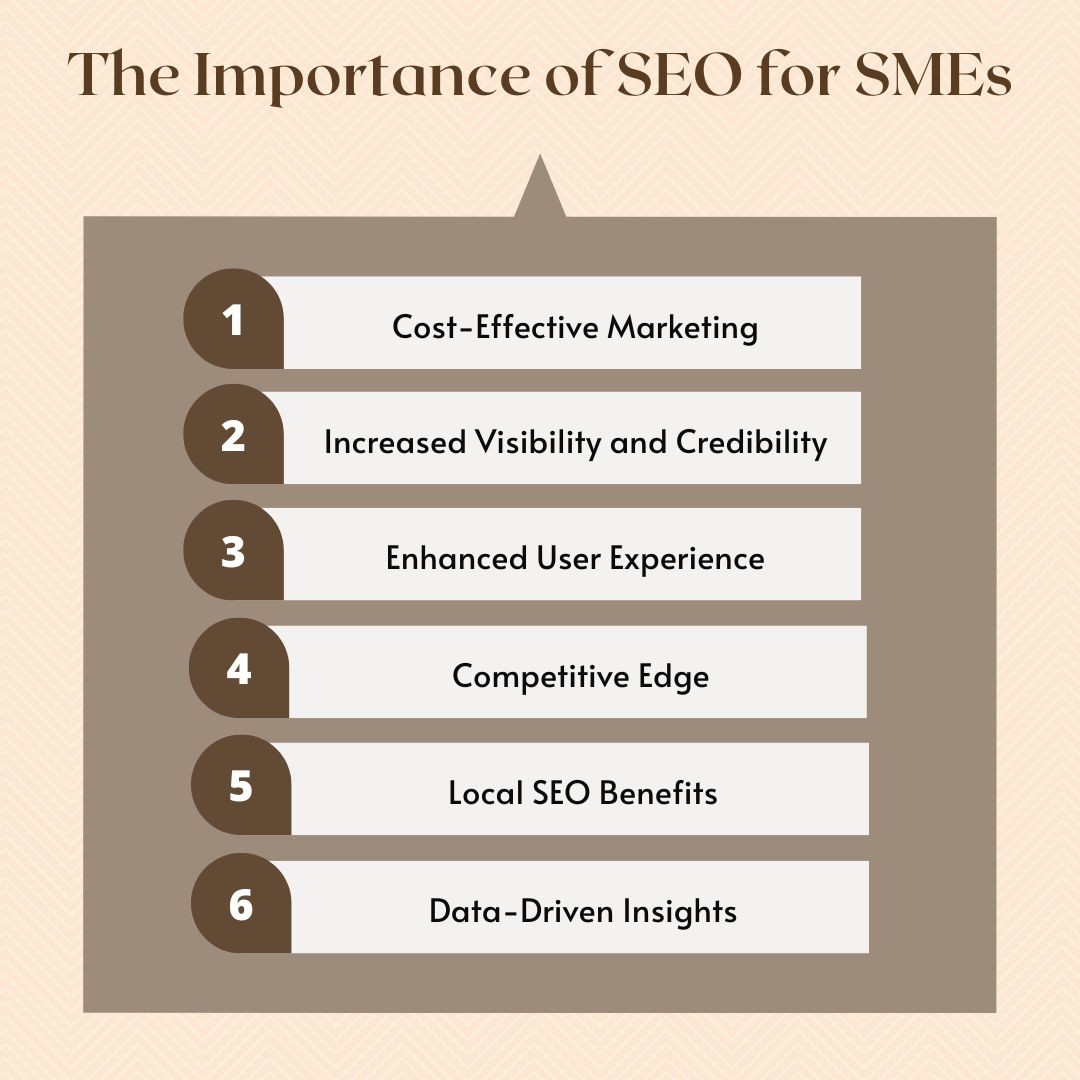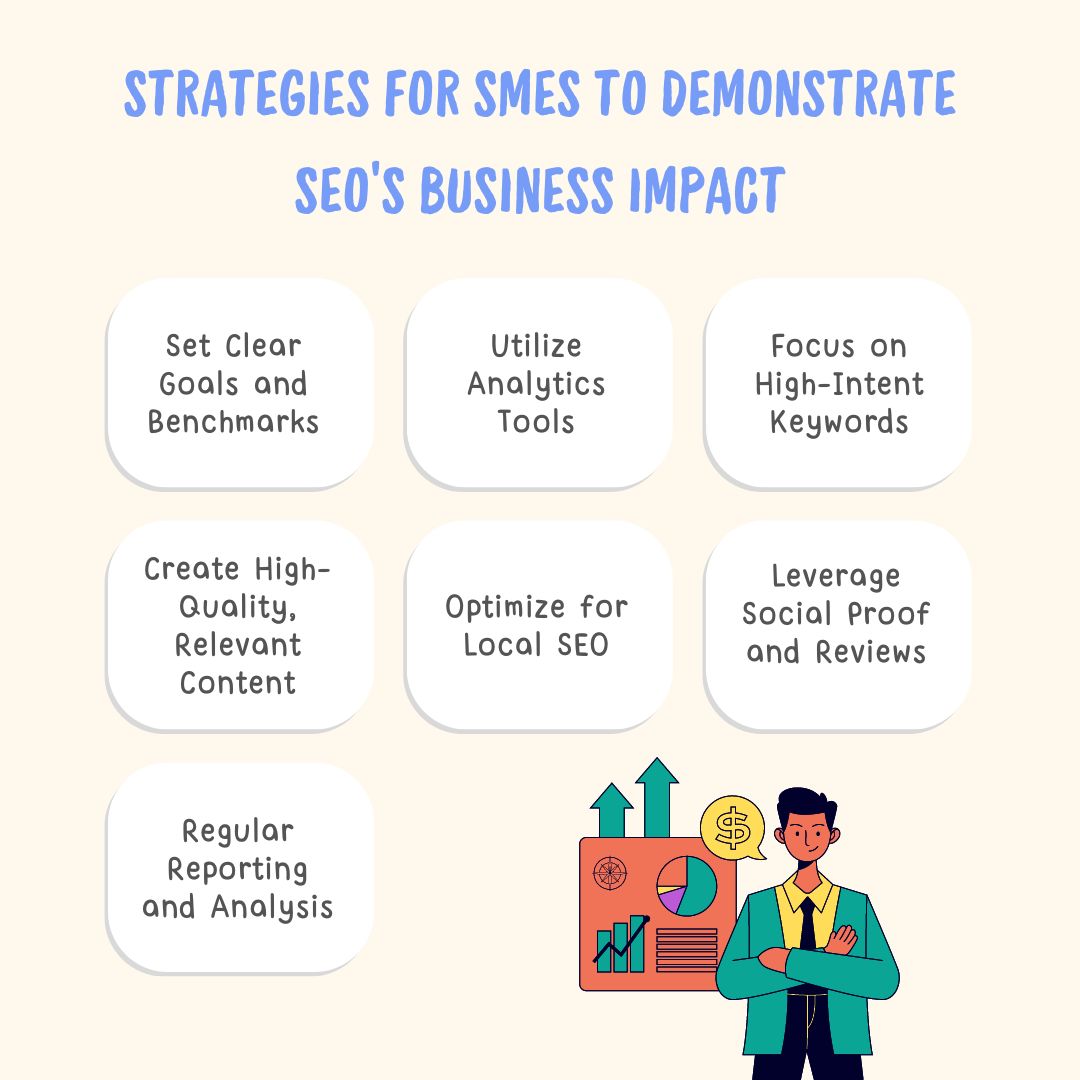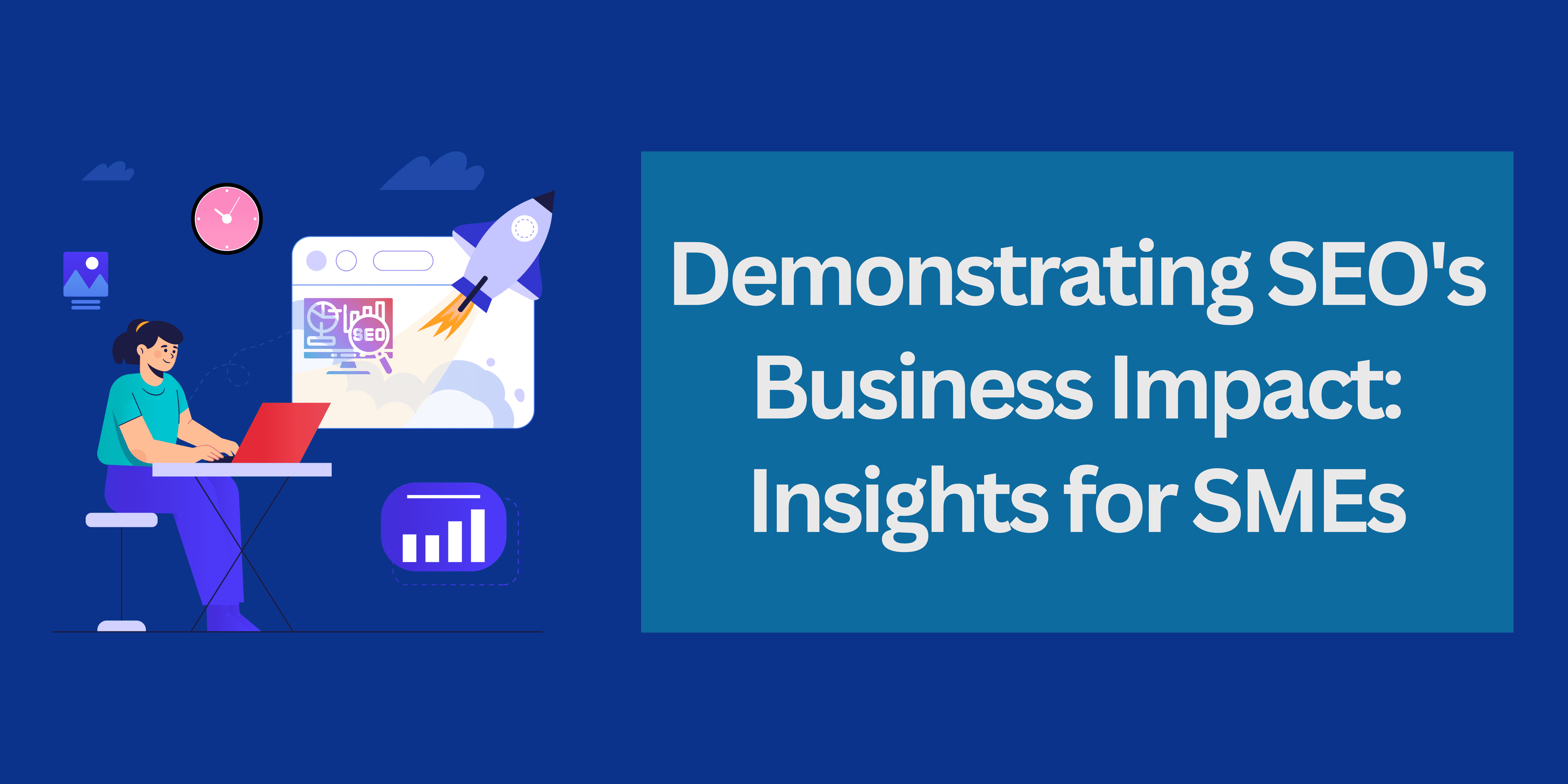Demonstrating SEO's Business Impact: Insights for SMEs
Published on:
Monday, July 15, 2024
Demonstrating SEO's Business Impact: Insights for SMEs
In the digital age, search engine optimization (SEO) has emerged as a fundamental strategy for businesses of all sizes aiming to enhance their online presence and attract potential customers. For small and medium-sized enterprises (SMEs), leveraging SEO effectively can be the key to competing with larger, more established companies. However, one of the perennial challenges that SMEs face is demonstrating the tangible business impact of their SEO efforts. Understanding and showcasing how SEO drives business growth, conversions, and overall success is essential for justifying investments in SEO and optimizing strategies for maximum return on investment (ROI).
The Importance of SEO for SMEs
SEO is not just about driving traffic to a website; it's about attracting the right kind of traffic that is more likely to convert into leads and sales. For SMEs, this means targeting specific keywords and optimizing content to appeal to their niche audience. Here’s why SEO is crucial for SMEs:

Cost-Effective Marketing: Compared to traditional advertising methods, SEO is a highly cost-effective strategy that can deliver long-term results. While paid ads can provide quick visibility, organic search traffic is often more valuable and sustainable. SMEs can invest in SEO to build a solid foundation for their online presence, leading to consistent and lasting traffic without the ongoing costs associated with paid campaigns. This makes SEO a smart financial choice, particularly for businesses with limited marketing budgets.
Increased Visibility and Credibility: A well-optimized website that appears on the first page of search engine results is more likely to be trusted by users. Higher visibility translates to increased brand recognition and credibility. When potential customers see a website ranking highly for relevant searches, they are more likely to perceive the business as an authority in its field. This trust can lead to higher click-through rates, more engagement, and ultimately more conversions, establishing the SME as a trusted player in its market.
Enhanced User Experience: Good SEO practices involve optimizing the website’s structure, speed, and content, which enhances the overall user experience. A positive user experience is critical for retaining visitors and converting them into customers. By ensuring that a website is easy to navigate, loads quickly, and provides valuable content, SMEs can keep visitors engaged longer, reduce bounce rates, and increase the likelihood of conversions. Additionally, search engines favor websites that offer a great user experience, which can further improve search rankings.
Competitive Edge: By effectively utilizing SEO, SMEs can compete with larger enterprises. A well-executed SEO strategy can help SMEs rank higher in search results, attracting more potential customers. Despite potentially smaller budgets, SMEs can focus on niche keywords and localized SEO to outperform larger competitors in specific areas. This level of targeted visibility can enable SMEs to capture market share and grow their customer base, even in highly competitive industries.
Local SEO Benefits: For SMEs that operate on a local level, local SEO is particularly beneficial. Optimizing for local search terms and ensuring that the business appears in local search results can significantly boost foot traffic to physical locations. Features like Google My Business allow SMEs to manage their online presence across Google, providing valuable information such as business hours, location, and customer reviews. This local optimization makes it easier for potential customers in the vicinity to find and choose the business over competitors.
Data-Driven Insights: SEO efforts generate valuable data and insights that can inform broader business strategies. By analyzing metrics such as website traffic, keyword performance, and user behavior, SMEs can gain a deeper understanding of their target audience. This information can guide content creation, product development, and marketing campaigns, ensuring that efforts are aligned with customer needs and preferences. Utilizing SEO analytics allows SMEs to make informed decisions and continuously improve their online presence and overall business performance.
SEO is an indispensable tool for SMEs looking to enhance their online presence, attract targeted traffic, and compete effectively in their markets. By investing in SEO, SMEs can achieve sustainable growth, build credibility, and gain valuable insights to drive their business forward.
Measuring the Business Impact of SEO
To demonstrate the business impact of SEO, SMEs need to focus on key performance indicators (KPIs) that align with their business goals. Here are some essential KPIs that can help measure the effectiveness of SEO efforts:
Organic Traffic: Tracking the volume of organic traffic over time is a primary indicator of SEO success. An increase in organic traffic suggests that the SEO strategies are working.
Conversion Rate: This metric measures the percentage of website visitors who complete a desired action, such as making a purchase or filling out a contact form. A higher conversion rate indicates that the website is effectively turning visitors into customers.
Keyword Rankings: Monitoring the rankings of targeted keywords helps in understanding how well the website is performing in search engine results. Higher rankings for relevant keywords can drive more qualified traffic to the site.
Bounce Rate: The bounce rate indicates the percentage of visitors who leave the website after viewing only one page. A lower bounce rate often signifies that the content is engaging and meets the visitors’ expectations.
Backlinks and Domain Authority: The number and quality of backlinks to a website are critical for SEO. A higher domain authority typically correlates with better search engine rankings.
Customer Lifetime Value (CLV): This metric helps in understanding the long-term value of customers acquired through SEO efforts. By tracking CLV, SMEs can assess the ROI of their SEO strategies.
Strategies for SMEs to Demonstrate SEO’s Business Impact
To effectively demonstrate the business impact of SEO, SMEs should implement a combination of qualitative and quantitative strategies:

Set Clear Goals and Benchmarks: Define specific, measurable goals for your SEO campaigns. Establish benchmarks for key metrics to track progress and measure success.
Utilize Analytics Tools: Leverage tools like Google Analytics, Google Search Console, and other SEO platforms to gather data on traffic, conversions, and user behavior. These insights are crucial for assessing the effectiveness of SEO efforts.
Focus on High-Intent Keywords: Identify and target keywords that have high commercial intent. These keywords are more likely to attract visitors who are ready to make a purchase or take other desired actions.
Create High-Quality, Relevant Content: Develop content that addresses the needs and interests of your target audience. High-quality content is more likely to engage visitors and drive conversions.
Optimize for Local SEO: For SMEs, especially those with physical locations, optimizing for local search is essential. Ensure your business is listed on local directories, and your website is optimized for local keywords.
Leverage Social Proof and Reviews: Encourage satisfied customers to leave reviews and testimonials. Positive social proof can enhance credibility and influence potential customers.
Regular Reporting and Analysis: Generate regular reports on SEO performance and analyze the data to identify trends, strengths, and areas for improvement. Share these reports with stakeholders to demonstrate the impact of SEO on business outcomes.
How Keyword Insight Pro Empowers SMEs
Keyword Insight Pro is designed to help SMEs navigate the complexities of SEO and demonstrate its business impact effectively. Here’s how our platform can transform your SEO strategy:
Integration with Google Analytics 4 (GA4) and Google Search Console (GSC): By integrating GSC data with GA4, Keyword Insight Pro provides a comprehensive view of keyword performance and its direct impact on conversions and sales. This integration enables SMEs to recapture the critical keyword insights lost due to Google’s encryption measures.
Conversion-Oriented Analytics: Unlike traditional SEO tools that focus on broad metrics, Keyword Insight Pro emphasizes conversion-oriented analytics. This focus helps SMEs identify which keywords are driving actual business results, such as sales and lead generation.
User-Friendly Interface and Actionable Insights: The platform’s intuitive design makes it easy for SMEs to interpret complex SEO data. Clear, actionable insights allow businesses to make informed decisions and optimize their strategies effectively.
Streamlined Reporting: Keyword Insight Pro simplifies the process of generating detailed reports on SEO performance. These reports can be customized to highlight the metrics that matter most to your business, making it easier to demonstrate the ROI of SEO efforts to stakeholders.
Take Action with Keyword Insight Pro
In the competitive digital landscape, SMEs cannot afford to overlook the importance of SEO. Demonstrating the business impact of SEO is crucial for justifying investments and optimizing strategies for maximum ROI. Keyword Insight Pro offers the tools and insights SMEs need to navigate the complexities of SEO and achieve measurable business outcomes.
For SMEs looking to enhance their SEO strategies and drive real, measurable results, Keyword Insight Pro is an indispensable ally. Our platform empowers businesses to unlock the full potential of their SEO efforts and demonstrate their impact on the bottom line.



